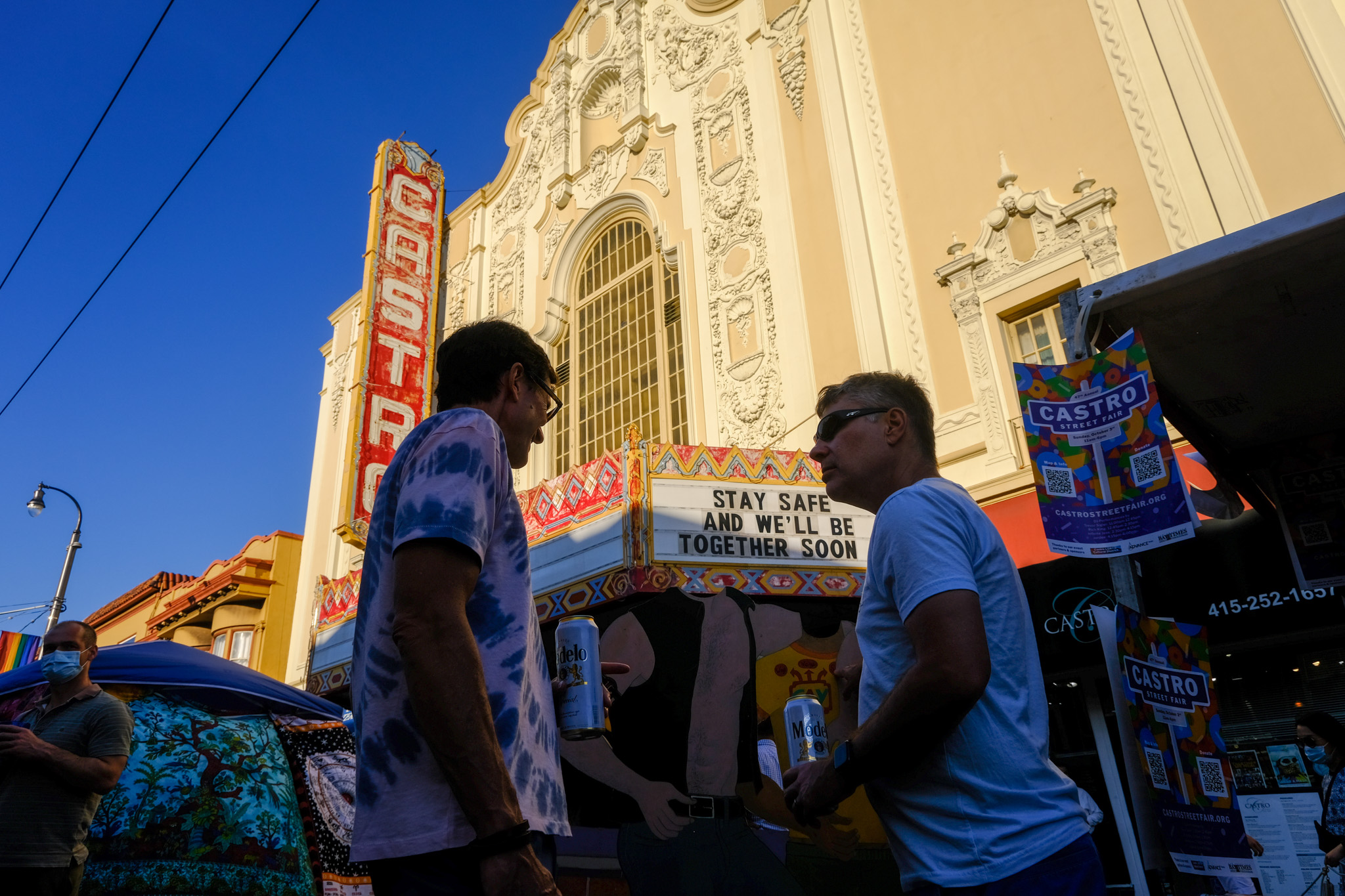With displeased patrons holding up signs reading “Save the Seats,” the 100-year-old Castro Theatre was the site of a raucous town hall Thursday night as hundreds of cineastes and LGBTQ+ community members filled the orchestra and balcony to express their opinions about Another Planet Entertainment’s planned changes to the venue.
At heart, the issue was about seats—specifically, the proposed removal of the front rows and the changes that would bring to the Castro. APE, the local promoter that operates Bill Graham Civic Auditorium, the Fox Theater in Oakland and the Greek Theatre in Berkeley, as well as festivals like Outside Lands, has taken over management of the theater from its original and current owners, the Nasser family. The company hopes to transform one of the last functioning 1920s movie palaces in America into a multipurpose venue that emphasizes live music, with repertory film screenings and LGBTQ+ community events reduced to a smaller, unspecified percentage of the overall programming.
Thursday’s town hall came in response to a feisty open letter from the Castro LGBTQ+ Cultural District in January, which alleged a lack of sensitivity to community concerns over the theater’s position, not only as a focal point of queer culture in San Francisco but as the crown jewel of Bay Area cinemas. A panel, led by Another Planet senior vice president Mary Conde, heard from several dozen speakers, whose views ranged from qualified support to vehement opposition.
Indeed, the three-hour town hall was filled with disruption, booing, accusations of bad faith and interruptions shouted from an audience that was largely older, gay, male and overwhelmingly Caucasian. Moderator Bevan Dufty, a BART director and the neighborhood’s former supervisor, who is now on Another Planet’s payroll as a consultant to the tune of $7,500 per month—as he himself volunteered—intervened numerous times to keep the tone civil.
A pre-recorded film featuring Another Planet CEO Gregg Perloff touted the proposed renovation to famed architect Timothy Pflueger’s masterpiece, from removing polyurethane slapped on the faded ceiling murals to a restoration of the chandelier. James Woolley, executive director of Frameline, the nation’s oldest LGBTQ+ film festival, also appeared onscreen lending support.
Access, broadly construed, remained the chief point of contention. APE and its supporters emphasized that a gentler ramp and a tiered flooring structure with “a series of lifts” and removable seats would make the theater more hospitable to people with disabilities. Conde did not provide details on the eventual seating capacity (currently 1,407) except to say that a final number had not been determined. However, one man who identified himself as an architect claimed that APE’s own renderings suggest that as many as 250 seats might be torn out.
Opponents cited architectural integrity, with many regarding those seemingly benign alterations as a stalking horse for a drastically revamped venue, one that charges unaffordable ticket prices to events that would largely draw, as one commenter put it, “rock ’n’ roll bros.”
“There must be some reason there’s no movie theater anywhere with portable chairs sitting on risers,” Peter Pastreich, executive director of the Castro Theater Conservancy, said to applause.
Asked about the continuation of repertory film screenings, Conde said that Another Planet plans for a “diversity of programming, including podcasts and comedy shows—it’s not going to be solely a music venue.” She declined to commit to informing patrons of the neighborhood’s queer culture and history. In response to fears that APE would partner solely with Ticketmaster, which is known for heavy surcharges, Conde declined to specify a ticketing partner. But in fairness, the Independent, another APE-run venue, contracts with Ticketweb.
For fans of Peaches Christ Productions and other camp staples of the Castro’s programming, Conde answered a question about honoring longstanding, if less-than-lucrative, partnerships with a crisp reply: “Rental rates for this space have been undervalued for quite some time.” (Approached for comment after the forum concluded, Conde declined.)
At times, people seemed to evaluate the project less on its merits and more on whether they felt adequately consulted about the changes—in spite of having no financial stake in the outcome. Largely unaddressed in the paeans to cinema was the fact that many weekday screenings in the age of Hulu play to dwindling audiences, sometimes barely more than a dozen people. And worries that live-music audiences consist of “bros” ignores the fact that queer-identified people enjoy live music too, to say nothing about how a woebegone neighborhood with many commercial vacancies might benefit from vastly increased foot traffic.
All the same, many people expressed confusion over why San Francisco needs another live music venue at all—let alone one that threatens the prime example of what LGBTQ+ historian Gerard Koskovich called “intangible cultural heritage.”
“No corporation will do the right thing. We don’t count yet—even as gay people in San Francisco, we don’t count when it comes to dollars and cents,” said Elizabeth Benson, who has worked with longtime Castro Theatre partner Lesbians Who Tech. “The last two minutes of speaking for its life were the best two minutes I’ve spent here. It’s where we could hold hands in the dark and not be afraid of dying.”
